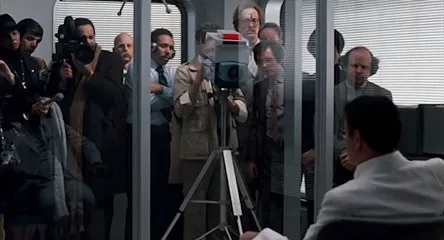Of course I'm alienated. I'm an alien.


In light of the talent involved -- in particular writer/director Marshall Brickman, flying solo for the first time after collaborating with Woody Allen on the screenplays for Sleeper, Annie Hall, and Manhattan -- it's a shame 1980's Simon is only fitfully amusing. Whatever its satirical intent, the film's fanciful story of an ordinary man who gets duped into believing he's an extraterrestrial by a think tank of diabolical geniuses doesn't hit nearly enough bull's eyes to be fully satisfying.
Poster boys for the old saying about idle hands doing the devil's work, the eggheads at the Institute for Advanced Concepts -- director Austin Pendleton, biochemist William Finley, behavioral modifier Jayant, geneticist Wallace Shawn, and media specialist Max Wright -- are appalled by the public's growing belief in alien visitors and decide to "give them what they want" in the form of suggestible assistant professor of psychology Simon Mendelssohn (Alan Arkin). Initially, Simon is thrilled to be asked to join the Institute so he can work on his "general theory of creativity" and be intellectually stimulated by his overqualified assistant (Madeline Kahn), but after he spends 197 hours in a sensory-deprivation tank, his mind becomes malleable enough that his colleagues are able to convince him he's an alien construct left on Earth 38 years earlier by his mother(ship). What they're unable to do is control him when he goes public and becomes a media sensation.
At its best moments, Simon recalls the absurdity of Sleeper (even Doris, the institute's supercomputer voiced by an uncredited Louise Lasser, is reminiscent of the one played by Douglas Rain in the earlier film), but it veers off-course when Simon's girlfriend Lisa (Judy Graubart) rescues him from the Institute and they wind up taking refuge with a bizarre cult that worships "the sacred box" and whose hymns are television jingles. By the time Simon begins broadcasting his petty grievances to the world at large -- kind of a low-wattage version of Network's Howard Beale -- there's little left for it to do but slowly wind down until it reaches its half-shrug of an ending.